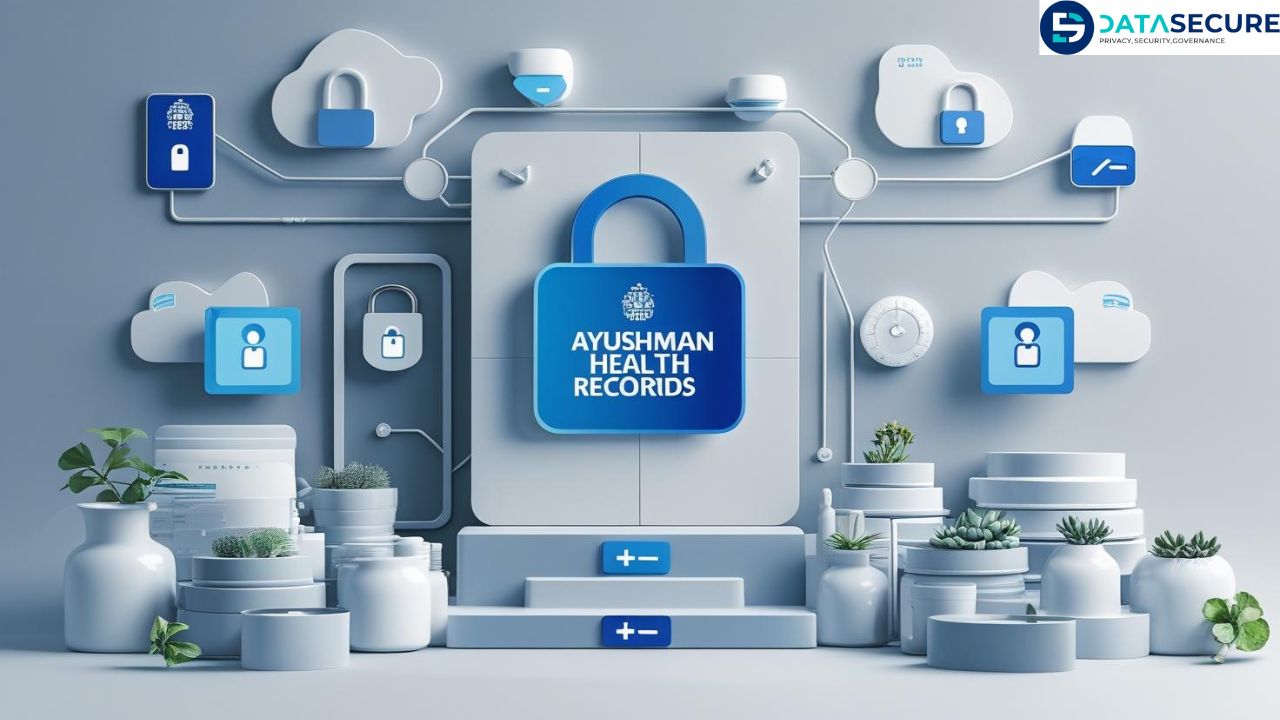Introduction
The digitization of healthcare is rapidly transforming the way medical information is created, stored, and accessed. At the heart of this transformation lies the concept of digital health records, which serve as electronic repositories of an individual’s medical history, diagnostic reports, prescriptions, and treatment outcomes. The phrase "digital health" was first mentioned in 2000 by Seth R Frank, denoting the use of the Internet to enhance medical information, connectivity, and business transactions. The government has pushed through initiatives such as the Ayushman Bharat Digital Mission (ABDM), which seeks to create a unified digital health ecosystem that can improve continuity of care, empower patients with control over their health information, and enhance efficiency in the healthcare system. However, the sensitivity of health data also raises pressing concerns around privacy, security, and ethical use. In India, where healthcare delivery has long struggled with issues of accessibility, affordability, and fragmented record-keeping, the shift towards digital health records represents both an opportunity and a challenge.
Digital Health Records in India
Digital health in India has evolved gradually since 1996, gaining formal policy recognition in the National Health Policy (NHP) 2017, which emphasized district-level health databases, integrated health information systems, and digital tools for AYUSH. To protect health data, the Ministry of Health and Family Welfare drafted the DISHA Act (2018), later merged into the broader data protection framework. The National Digital Health Blueprint (2019) envisioned a federated health information architecture linking public and private systems, including modern medicine and AYUSH.
During the COVID-19 pandemic, applications like Aarogya Setu and CoWIN demonstrated the potential of large-scale digital health adoption. The National Digital Health Mission (NDHM) was launched in 2020 as a pilot and rolled out nationwide in 2021, rebranded as the Ayushman Bharat Digital Mission (ABDM). ABDM introduced key components such as the ABHA ID, Health Facility Registry, Healthcare Professionals Registry, and Unified Health Interface to ensure interoperability and security of health data.
By October 2023, ABDM had achieved notable progress:
- 46.8 crore ABHA IDs created, with over 31 crore health records linked.
- More than 2.2 lakh health facilities and 2.3 lakh healthcare professionals verified.
- Over 50 digital health applications integrated, spanning both government and private sectors.
- Innovative services like QR code–based OPD registration reduced waiting times for patients.
Despite early challenges of fragmented systems and siloed digital initiatives (e.g., RCH portal, Nikshay, e-Raktkosh), ABDM now represents a unified digital health ecosystem. Its achievements have been recognized globally, including by the WHO and during India’s G20 Presidency.
Ayushman Bharat Digital Mission (ABDM)

The Ayushman Bharat Digital Mission (ABDM) is the government’s flagship initiative to build a unified digital health ecosystem in India. Its core objective is to provide every citizen with a unique health ID (ABHA number) that links medical records across hospitals, clinics, and digital platforms, ensuring interoperability and seamless access to health information. The mission rests on key building blocks: the Health ID for individuals, the Health Facility Registry cataloguing hospitals and clinics, the Health Professional Registry for verified medical practitioners, and the Unified Health Interface (UHI), which acts as a digital platform for secure and standardized health data exchange. A key service under ABDM is ‘Scan and Share,’ a digital feature that enables patients to register at hospitals by scanning a QR code and sharing their ABHA number through health apps, ensuring paperless registration, efficient hospital management, and seamless linking of health records to their digital health account.
The ‘Scan and Share’ service under the Ayushman Bharat Digital Mission (ABDM) is operational in 125 districts across 25 States and UTs, involving 365 government and private hospitals. By scanning a QR code displayed at registration counters through apps like ABHA, Aarogya Setu, EkaCare, or PayTM, patients can instantly share basic details such as name, age, gender, and ABHA number with the hospital’s system. This enables paperless registration, instant token generation, reduced waiting time, and efficient use of hospital resources. Importantly, it also links patients’ health records to their Ayushman Bharat Health Account, accessible anytime through their mobile devices.
Privacy Concerns

Patient’s health data is a very sensitive piece of information with a lot of repercussions if not handled with care. India’s attempt to digitalise the health records of patients puts their privacy and safety at risk. One of the foremost concerns is the risk of unauthorized access and misuse. Digital records, if inadequately protected, can be exploited by third parties such as insurers, employers, or even data brokers, leading to discrimination, profiling, or financial harm. Cases of healthcare data breaches worldwide illustrate how valuable such data is for cybercriminals, and India’s growing digital ecosystem is not immune to these risks.
Another issue is the lack of strong patient consent mechanisms. Although ABDM incorporates the concept of informed consent, in practice many patients remain unaware of how their data is stored, shared, or used. This asymmetry of knowledge reduces patient autonomy and raises the danger of consent becoming a mere formality rather than a meaningful safeguard.
Moreover, the digital divide adds another dimension to privacy concerns. Rural populations and digitally illiterate patients may have little understanding of their rights over health data, making them more vulnerable to exploitation. Without adequate public awareness and digital literacy initiatives, privacy safeguards may remain ineffective in practice.
Regulatory Authorities and Framework for Digital Health in India

The regulatory framework for digital health and Electronic Health Records (EHRs) in India is relatively new and still evolving. Two early frameworks were proposed — the Draft Digital Information Security in Healthcare Act, 2018 (DISHA) and the National Digital Health Blueprint, 2019 (NDHB). While DISHA was a draft law establishing the National Electronic Health Authority (NeHA) to set standards and ensure privacy, confidentiality, and security, NDHB was a policy blueprint that proposed the National Digital Health Mission (NDHM) as an institutional mechanism to build a federated digital health ecosystem with health IDs, registries, and data-sharing infrastructure.
In December 2019, the Personal Data Protection (PDP) Bill was introduced, later evolving into the Digital Personal Data Protection Act, 2023 (DPDP Act). Unlike DISHA, which explicitly recognises patients as the owners of their health data and prohibits its commercial use, the DPDP Act adopts a broader framework that does not define ownership and allows for wider lawful processing of data. This divergence illustrates challenges in harmonising India’s digital health governance.
Key Regulatory Authorities:
- Central Drugs Standard Control Organisation (CDSCO): Regulates drugs, medical devices, and diagnostics under the Drugs and Cosmetics Act, 1940.
- Drug Controller General of India (DCGI): Approves new drugs, vaccines, and medical devices, and oversees safety standards.
- Medical Council of India (now NMC): Regulates the practice of medicine and professional ethics.
- Copyright Office & Office of the Controller General of Patents, Designs and Trademarks: Handle intellectual property protection for health tech innovations.
- Indian Council of Medical Research (ICMR): Supports digital health research and contributed to the NDHB.
- Proposed National Digital Health Authority (NeHA): Envisioned to oversee interoperability standards and integrated health information systems.
The fragmented regulatory landscape complicates privacy protection. While the Digital Personal Data Protection Act, 2023 (DPDP Act) provides a general framework for safeguarding personal data, India does not yet have a sector-specific law for health data comparable to HIPAA in the United States or GDPR’s explicit provisions in the European Union. As a result, questions remain about enforcement, grievance redressal, and the accountability of health data fiduciaries under ABDM.
The Way Forward
For India’s digital health ecosystem to succeed, privacy and security must be at its core. Strengthening consent mechanisms is crucial so that patients retain meaningful control over who can access their data and for what purpose, with options to withdraw consent at any stage. Healthcare also requires sector-specific safeguards beyond the general provisions of the Digital Personal Data Protection Act, 2023. Clear limits on data retention, restrictions on secondary use, and prohibitions on commercial exploitation of health records will ensure patient trust and protect sensitive medical information.
An independent health data regulator is needed to oversee compliance, monitor breaches, and enforce accountability. Such a body could also set interoperability standards and ensure that hospitals, insurers, and digital platforms exchange information securely. Strong encryption, anonymization, and audit trails should be integral to system architecture rather than optional safeguards.
Finally, public awareness and digital literacy campaigns are essential. Patients must know their rights and safe data practices to engage confidently with digital healthcare. By combining legal, technical, and social measures, India can build a digital health system that is both innovative and rights-respecting.
Conclusion
The move towards digital health records under the Ayushman Bharat Digital Mission marks a transformative step in India’s healthcare landscape, promising efficiency, accessibility, and innovation. Yet, the sensitivity of health data makes privacy and security indispensable pillars of this transformation. Without strong safeguards, the risks of surveillance, misuse, and loss of public trust could undermine the very goals of digital health.
By embedding robust consent frameworks, adopting sector-specific protections, creating independent oversight, and promoting digital literacy, India can strike a balance between technological progress and individual rights. A secure and transparent digital health ecosystem will not only improve patient care but also reinforce trust in the state’s vision of inclusive and accountable healthcare.
We at Data Secure (Data Privacy Automation Solution) DATA SECURE - Data Privacy Automation Solution can help you to understand EU GDPR and its ramificationsand design a solution to meet compliance and the regulatoryframework of EU GDPR and avoid potentially costly fines.
We can design and implement RoPA, DPIA and PIA assessments for meeting compliance and mitigating risks as per the requirement of legal and regulatory frameworks on privacy regulations across the globe especially conforming to GDPR, UK DPA 2018, CCPA, India Digital Personal Data Protection Act 2023. For more details, kindly visit DPO India – Your outsourced DPO Partner in 2025 (dpo-india.com).
For any demo/presentation of solutions on Data Privacy and Privacy Management as per EU GDPR, CCPA, CPRA or India DPDP Act 2023 and Secure Email transmission, kindly write to us at info@datasecure.ind.in or dpo@dpo-india.com.
For downloading the various Global Privacy Laws kindly visit the Resources page of DPO India - Your Outsourced DPO Partner in 2025
We serve as a comprehensive resource on the Digital Personal Data Protection Act, 2023 (Digital Personal Data Protection Act 2023 & Draft DPDP Rules 2025), India's landmark legislation on digital personal data protection. It provides access to the full text of the Act, the Draft DPDP Rules 2025, and detailed breakdowns of each chapter, covering topics such as data fiduciary obligations, rights of data principals, and the establishment of the Data Protection Board of India. For more details, kindly visit DPDP Act 2023 – Digital Personal Data Protection Act 2023 & Draft DPDP Rules 2025
We provide in-depth solutions and content on AI Risk Assessment and compliance, privacy regulations, and emerging industry trends. Our goal is to establish a credible platform that keeps businesses and professionals informed while also paving the way for future services in AI and privacy assessments. To Know More, Kindly Visit – Your Trusted Partner in AI Risk Assessment and Privacy Compliance | AI-Nexus
